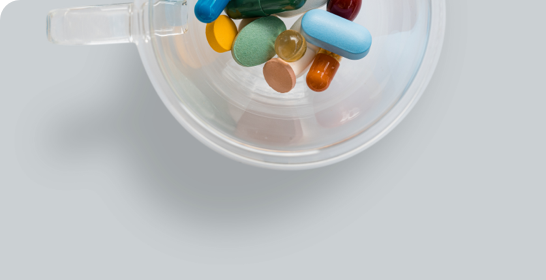We use cookies to make your experience better. To comply with the new e-Privacy directive, we need to ask for your consent to set the cookies. Learn more.
Vitamin K2 - MK7 (Menaquinone MK7)
BioK2 Key Facts
High Isomeric Purity - all-trans Isomer content typically >100%
- - Menaquinone-6: Typically Nil (USP limit 10%)
- - Cis-menaquinone-7: NMT 0.2% (USP limit 2.0%)
Micro-encapsulated form of all trans Vitamin K2 – MK7 for high formulation stability
Background
Vitamin K naturally exists in two forms, phylloquinone (vitamin K1) and menaquinone (vitamin K2). Vitamin K1 is the most abundant source of vitamin K in the diet (Beulens et al., 2013), found primarily in green leafy vegetables. In contrast, Vitamin K2 is only found in modest amounts in various animal-based, dairy and fermented foods. Natto, a Japanese fermented soybean is the richest dietary source of vitamin K2 (Halder et al., 2019), however, this has a very strong smell and taste which many find unpalatable, as well as its consumption being very rare outside Japan. This means that consuming sufficient Vitamin K2 through the diet would require the consumption of impractically large quantities of K2 rich food and therefore obtaining adequate levels of K2 must be achieved through supplementation (Berenjian et al., 2013).
MK-7
There are numerous menaquinones, which are generally denoted as MK-n, with n representing the number of isoprene residues in the side chain. The length of this side chain influences the efficacy and bioavailability of the menaquinone. Menaquinone-7 (MK-7) having 7 isoprene residue in the side chain has been found to be the most efficiently absorbed and bioavailable form of vitamin K (Simes et al., 2020), as well as having the longest half-life of all vitamin K homologs (Schurgers et al., 2007). MK-7 has been widely studied and has demonstrated a protective effect against osteoporosis and cardiovascular diseases (Szulc et al., 1994; Beulens et al., 2013) on top of its role in blood coagulation, that vitamin K is widely known for. MK-7 can exist as cis and trans isomers and this structure influences the biological activity of MK-7 (Lal & Berenjian, 2020). This is vitally important when looking to supplement MK-7, as the cis isomer has been shown to exhibit only 1% of the biological activity of the trans form (Knauer et al., 1975). BioK2 is an all-trans form of MK-7.
BioK2 is available in many different forms.
This included micro-encapsulated MK-7, water dispersible form for beverages, powder trituration and oil form. At present, we have the following variants of BioK2; other compositions are available on request.
BioK2 100MEP - Menaquinone – 7 - 1.0% [10,000 ppm] micro-encapsulated powder [Vitamin K2 –MK7]
BioK2 100CWD - Menaquinone-7 - 1.0% [10,000 ppm] micro-encapsulated CWD powder [Vitamin K2 –MK7] [Beverage grade]
BioK2 100P - Menaquinone – 7 - 1.0% [10,000 ppm] powder [Vitamin K2 –MK7]
BioK2 100O - Menaquinone – 7 - 1.0% [10,000 ppm] oil [Vitamin K2 –MK7]
BioK2 500O - Menaquinone – 7 - 5.0% [50,000 ppm] oil [Vitamin K2 –MK7]
Chemistry
CAS - 2124-57-4; 27670-94-6
Molecular Formula - C46H64O2
Molecular Weight - 649.016 g/ mol
IUPAC - 2-[(2E,6E,10E,14E,18E,22E)-3,7,11,15,19,23,27-heptamethyloctacosa-2,6,10,14,18,22,26-heptaenyl]-3-methylnaphthalene-1,4-dione
K2 and Health
Coronary Calcification and Cardiovascular Health
Coronary artery calcification is an important predictor of cardiovascular disease (Mori et al., 2018). Vitamin K2 acts as a cofactor of Matrix Gla Protein (MGP), which has been shown to reduce vascular calcification (Shanahan et al., 1998) and therefore vitamin K2 may help reduce the risk of cardiovascular disease (Beulens et al., 2013).
Bone Health
Some studies have suggested that MGP helps facilitate normal bone growth and development (Booth, 1997). Individuals who have a low vitamin K status are at higher risk of hip fractures (Booth et al., 2000) and possess lower bone mineral density (Szulc et al., 1994). Women, especially post-menopausal women, who are at a much greater risk of bone fractures due to a natural decline in bone mineral density can especially benefit from an increase in Vitamin K2 in their diet. Vitamin K has also been shown to reduce reactive oxygen species levels, preventing redox imbalance and therefore being beneficial for bone growth and regeneration, with MK-7 showing the greatest effect (Ambrożewicz et al., 2019).
Prostate Cancer
A large observational study found there to be an inverse relationship between vitamin K intake and prostate cancer risk, finding that higher intakes of menaquinones decreased the risk of prostate cancer (Nimptsch et al., 2008). It was also observed in the same study that there was no association between vitamin K1 and prostate cancer risk, further emphasising the need for a vitamin K2 supplement.
Anticoagulant Medications
It is vitally important that individuals consult a doctor before they begin supplementing vitamin K2 if they are already taking anticoagulant medications (E.g. warfarin,heparin, phenprocoumon, acenocoumarol, and tioclomarol). These drugs antagonise the activity of Vitamin K which results in the depletion of vitamin K-dependent clotting factors, therefore individuals taking these drugs must monitor their vitamin K very closely intake and maintain a consistent levels as sudden changes in intake can interfere with the drugs causing an increase or decrease in their anticoagulant effects (Di Minno et al., 2017).
EFSA Approved Health Claims
Vitamin K contributes to normal blood clotting. (2009;7(9):1228)
Vitamin K contributes to the maintenance of normal bones. (2009;7(9):1228)
Trademark
BioK2 is a trademark of Vita Actives, EU trademark number 018179261.
References
- Ambrożewicz, E., Muszyńska, M., Tokajuk, G., Grynkiewicz, G., Žarković, N. and Skrzydlewska, E., 2019. Beneficial Effects of Vitamins K and D3 on Redox Balance of Human Osteoblasts Cultured with Hydroxyapatite-Based Biomaterials. Cells, 8(4), p.325.
- Berenjian, A., Mahanama, R., Talbot, A., Regtop, H., Kavanagh, J. and Dehghani, F., 2013. Designing of an Intensification Process for Biosynthesis and Recovery of Menaquinone-7. Applied Biochemistry and Biotechnology, 172(3), pp.1347-1357.
- Beulens, J., Booth, S., van den Heuvel, E., Stoecklin, E., Baka, A. and Vermeer, C., 2013. The role of menaquinones (vitamin K2) in human health. British Journal of Nutrition, 110(8), pp.1357-1368.
- Booth, S., 2009. Skeletal Functions of Vitamin K-Dependent Proteins: Not Just for Clotting Anymore. Nutrition Reviews, 55(7), pp.282-284.
- Booth, S., Tucker, K., Chen, H., Hannan, M., Gagnon, D., Cupples, L., Wilson, P., Ordovas, J., Schaefer, E., Dawson-Hughes, B. and Kiel, D., 2000. Dietary vitamin K intakes are associated with hip fracture but not with bone mineral density in elderly men and women. The American Journal of Clinical Nutrition, 71(5), pp.1201-1208.
- Di Minno, A., Frigerio, B., Spadarella, G., Ravani, A., Sansaro, D., Amato, M., Kitzmiller, J., Pepi, M., Tremoli, E. and Baldassarre, D., 2017. Old and new oral anticoagulants: Food, herbal medicines and drug interactions. Blood Reviews, 31(4), pp.193-203.
- Halder, M., Petsophonsakul, P., Akbulut, A., Pavlic, A., Bohan, F., Anderson, E., Maresz, K., Kramann, R. and Schurgers, L., 2019. Vitamin K: Double Bonds beyond Coagulation Insights into Differences between Vitamin K1 and K2 in Health and Disease. International Journal of Molecular Sciences, 20(4), p.896.
- Knauer, T., Siegfried, C., Willingham, A. and Matschiner, J., 1975. Metabolism and Biological Activity of cis- and trans-Phylloquinone in the Rat. The Journal of Nutrition, 105(12), pp.1519-1524.
- Lal, N. and Berenjian, A., 2020. Cis and trans isomers of the vitamin menaquinone-7: which one is biologically significant? Applied Microbiology and Biotechnology, 104(7), pp.2765-2776.
- Mori, H., Torii, S., Kutyna, M., Sakamoto, A., Finn, A. and Virmani, R., 2018. Coronary Artery Calcification and its Progression. JACC: Cardiovascular Imaging, 11(1), pp.127-142.
- Nimptsch, K., Rohrmann, S. and Linseisen, J., 2008. Dietary intake of vitamin K and risk of prostate cancer in the Heidelberg cohort of the European Prospective Investigation into Cancer and Nutrition (EPIC-Heidelberg). The American Journal of Clinical Nutrition, 87(4), pp.985-992.
- Schurgers, L., Teunissen, K., Hamulyák, K., Knapen, M., Vik, H. and Vermeer, C., 2006. Vitamin K–containing dietary supplements: comparison of synthetic vitamin K1 and natto-derived menaquinone-7. Blood, 109(8), pp.3279-3283.
- Shanahan, C., Proudfoot, D., Farzaneh-Far, A. and Weissberg, P., 1998. The Role of Gla Proteins in Vascular Calcification. Critical Reviews in Eukaryotic Gene Expression, 8(3-4), pp.357-375.
- Simes, D., Viegas, C., Araújo, N. and Marreiros, C., 2020. Vitamin K as a Diet Supplement with Impact in Human Health: Current Evidence in Age-Related Diseases. Nutrients, 12(1), p.138.
- Szulc, P., Arlot, M., Chapuy, M., Duboeuf, F., Meunier, P. and Delmas, P., 2009. Serum undercarboxylated osteocalcin correlates with hip bone mineral density in elderly women. Journal of Bone and Mineral Research, 9(10), pp.1591-1595.




